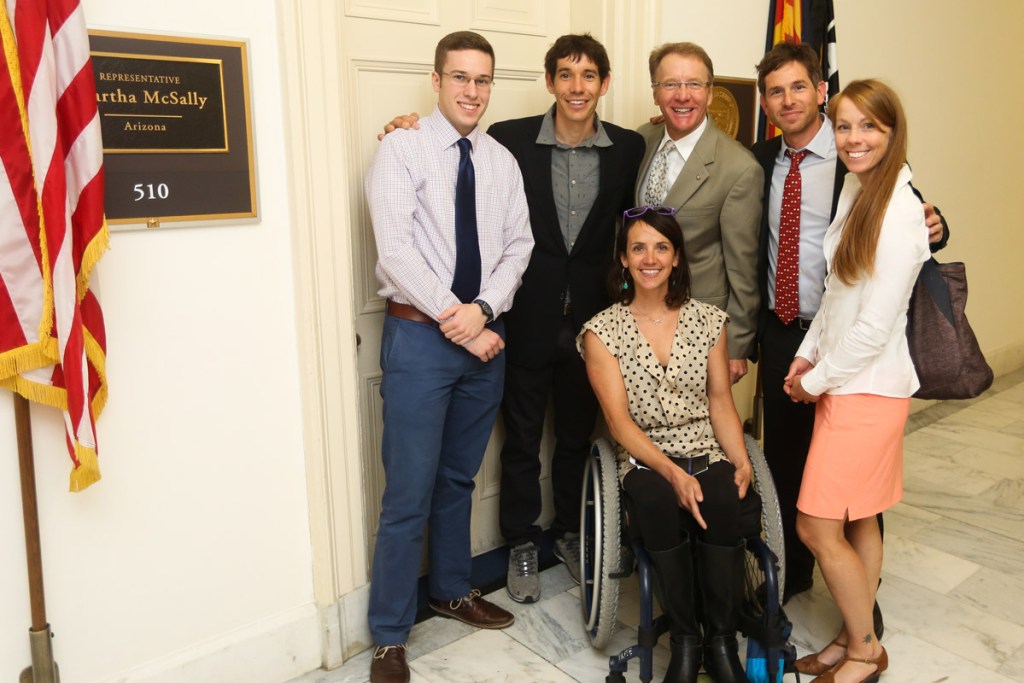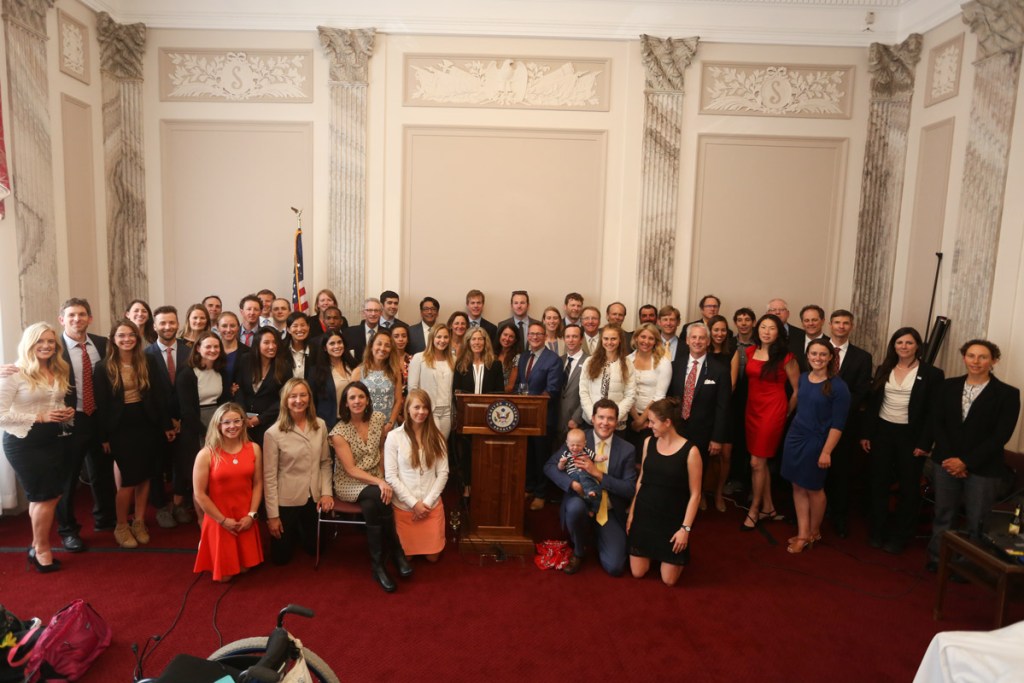Professional climbers, outdoor advocates and lawmakers alike are making a renewed push for simplifying access to the outdoors through the Recreation Not Red-Tape Act (RNR). Last week, they gathered as part of Climb the Hill, an annual advocacy trip organized by the American Alpine Club and Access Fund. Over the course of three days, 50 climbers, including Tommy Caldwell, Margo Hayes, Alex Honnold, Mikhail Martin and Sasha DiGiulian, traveled to Washington, D.C., to advocate for public lands, outdoor recreation and improved climbing management—and rallying support for RNR was one of their top objectives.
Senator Ron Wyden (D-OR) and Representative Rob Bishop (R-UT) first introduced the bipartisan legislation (S.1633 and H.R.3400) in their respective chambers last summer. If passed, the act would allow Congress to designate national recreation areas—public lands that don’t meet wilderness criteria (like wild and scenic rivers or national parks) but still should be federally managed—using information generated by land managers. In addition, it would eliminate permitting red tape, like multiple permits for a single trip, allowing outfitters and guides easier access to public lands. And recreationalists would be able to purchase federal and state recreation passes in the same online transaction. In summary, it’s a big deal for anyone who wants to get outside in a group or passes through multiple land jurisdictions in a single rafting or climbing trip, for example.
For now, climbers and the recreation community are garnering support for the act and hoping for a vote in both the House and Senate this summer. Last Wednesday as part of a Climb the Hill event, Senator Wyden and Senator Joni Ernst (R-IA) joined forces at the REI Flagship in D.C. to show their bipartisan support of the RNR Act. “Given the tension in the country today, it’s refreshing there’s still one issue that can transcend party lines: the transformative power of the outdoors,” said Taldi Walter, government and community affairs manager for REI. “Seeing Senators Wyden and Ernst come together as a united front, in support of increased access to the outdoors for all, was a powerful reminder that access to public lands is a right each of us has regardless of politics.”

Alex Honnold (second from left), Erik Murdock of the Access Fund(second from right) and Quinn Brett (front center) with staff members at Martha McSally’s (R-AZ) office. PC: Stephen Gosling.
REI has been part of a group called the Coalition for Outdoor Access for the past four years. The coalition, which includes nonprofits, outfitters, universities, advocacy groups and outdoor industry representatives, has focused on a number of topics with the goal of breaking down confusing permitting barriers—like needing multiple permits for a single trip—that can limit people’s ability to get outside. The coalition’s suggestions about permitting became the RNR Act. “For a lot of people, outfitters, guides and nonprofits are the first way they experience the backcountry or the outdoors. Ensuring there are streamlined, transparent permitting processes in place will ensure more access for all to enjoy their public lands,” Walter said. That’s why REI has been an advocate for RNR and for Climb the Hill more broadly.
Beginning in 2016, the Access Fund and American Alpine Club have teamed up with influential climbers, climbing advocates and industry partners to speak up for these beloved places through Climb the Hill. “Public lands are the cornerstone of outdoor recreation and for our way of life. Right now, public lands are under attack,” said Maria Povec, policy and advocacy director of the American Alpine Club.
For many of the climbers, Climb the Hill marked their first time advocating for policy change. “This was my first visit to Washington, D.C., and Capitol Hill. The process of laws and policy-making seemed rather removed until now,” said Margo Hayes, the first woman to climb 5.15a. Climb the Hill began with a briefing last Wednesday night in D.C., where climbers learned how to effectively share their personal experiences and offer background information about the importance of public lands and the outdoor industry. “To have a presence on the Hill is really important. It’s something anyone can do. [Climb the Hill] empowers people and helps them feel confident so they can tell their unique stories and speak up for public lands,” Povec said.
Participants spent the next two days talking with members of Congress, staffers and land managers.
This year, Climb the Hill focused on four key issues:
1. Recreation Not Red-Tape Act: This act would simplify and streamline outfitter and guide permitting. Members of Congress are asked to support the act when it comes to a vote in the next few months. The House version of the bill would also ensure that 4th graders continue to get free national park passes and encourage broader use of conservation service corps for stewardship projects.
2. Antiquities Act: This 1906 act gives the president the authority to designate national monuments. Last year, two monuments were reduced in size, and a number of others remain at risk of negative Administrative action. Members of Congress were asked to oppose the modification or elimination of national monuments—especially Bears Ears and Grand Staircase-Escalante in Utah.
3. Land and Water Conservation Fund (LWCF): Created by Congress in 1964, the fund “invests earnings from offshore oil and gas leasing to help strengthen communities, preserve our history and protect our national endowment of lands and waters,” according to the Department of the Interior. The fund is authorized at $900 million per year, but Congress doesn’t always appropriate the entire amount. The LWCF is up for reauthorization in September, and Climb the Hill participants asked Congress to permanently reauthorize and fully fund the LWCF.
4. Balanced Energy Development: Climb the Hill participants advocated for land management policies that are based on public input and science. They asked lawmakers to oppose bills and initiatives that support the reduction or revocation of national monuments for energy development.
Mikhail Martin of Brothers of Climbing spoke with New York Republican Representatives Tom Reed, John Katko and John Faso as well as Democratic Senator Chuck Schumer. “My role was to share my story—I’m someone who grew up in a place without mountains. Because I got into climbing, I could escape,” he said. This kind of storytelling makes connections between climbers and their representatives. Climb the Hill participants were thrilled to learn that during the course of the event RNR got a new co-sponsor, Senator Angus King (I-ME), which could help bolster the act should it come to a vote soon.

2018 Climb the Hill delegation. PC: Stephen Gosling.
This year’s Climb the Hill builds on the success seen in the past. The first year, the effort focused on building relationships between lawmakers and the climbing community. Another aim: reminding climbers they have a responsibility to come to the table in these discussions. As Hayes put it this year, “I realized that it is my responsibility to preserve and protect the areas where I climb. I want those areas accessible to future generations.” Climbers lobbied for the Outdoor Recreation Jobs and Economic Impact Act of 2016, which ensures outdoor industry jobs and economic impact are accounted for as part of the gross domestic product (GDP), which ultimately passed.
Last year, participants asked representatives and senators to join the new outdoor recreation caucuses. After just one day of lobbying, more than a dozen members of Congress joined, the American Alpine Club reported. Also in 2017, Tommy Caldwell met with Representative Jared Polis (D-CO) during Climb the Hill. When the American Alpine Club was looking for more Democratic support for the RNR Act, they reached out to Rep. Polis and had his support—in part because of the connections they had made during the previous Climb the Hill, the American Alpine Club said.
It’s these tangible results that make Martin believe that climbers have a responsibility to speak up for public lands. “It’s one of our fundamental rights to have our representatives fight for what we care about,” he said.
Martin says this responsibility extends beyond Climb the Hill. “These public lands are yours, and we should protect them. Do what you can—small things go a long way,” he said. Those small things include calling or writing your representatives to talk about the importance of public lands.
Martin and others left the Climb the Hill feeling optimistic. “Climbing has arrived,” Walters said. “The essence of what it felt like to be there was that climbers matter, climbing is a legitimate sport. The time is now to speak up for the sport and speak up for the lands that we all want to recreate on.”
Your voice matters too. Learn more about how to advocate for your public lands.
